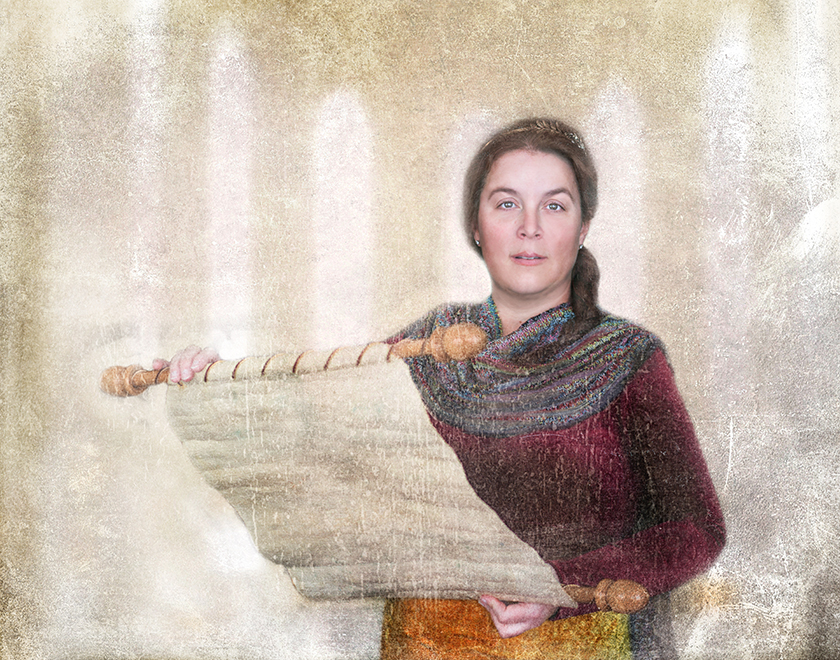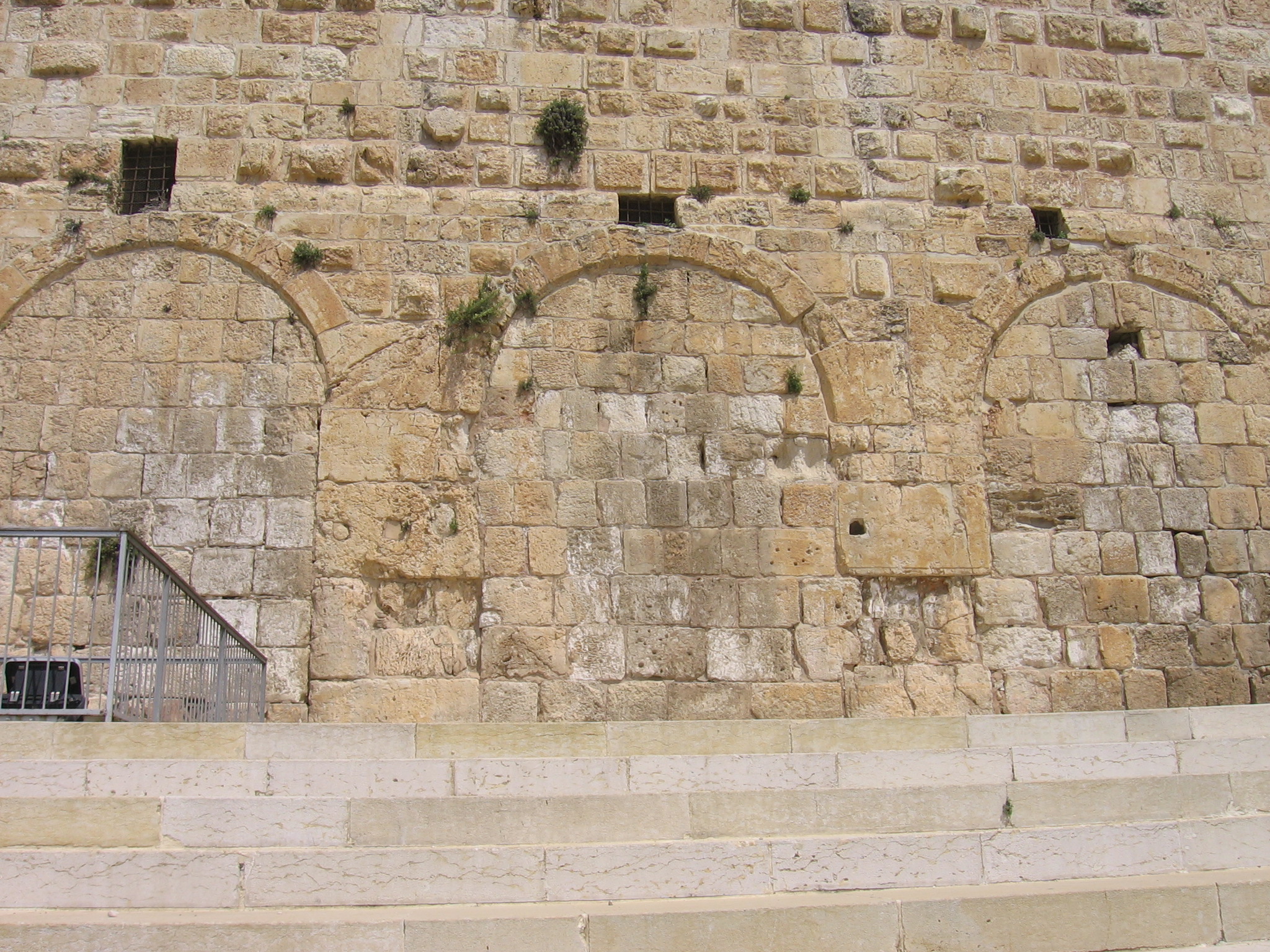
“Huldah” by Mandy Jane Williams
II Kings 22:12-20
II Chronicles 34:22-28
Background: 7 Century BC
Josiah, the king of Judah, was placed on the throne by the people when he was 8- years-old. When he was16 he began to seek after the God of David and to do what was right. When he was 20 he began to purge Judah and Jerusalem of all the carved images and other idolatrous worship (II Chronicles 34:1-3). When he was 26- years-old he began to have the temple repaired; previous kings had defiled and used the temple for the worship of false Gods. While they were repairing the temple, Hilkiah the high priest, found”the book of the law of the Lord give by Moses” (II Chronicles 34:8-15). The scribe read it to Josiah. When Josiah heard the words he rent his clothes (II Chronicles 34:18-19). He was worried about the prophecies written in the book and so he sent several of his men to ask Huldah, the prophetess, what would happen to his people because because they had not kept the words that were written in the book.
Facts about her:
- She dwelt in the college, also known as the “Mishneh” or “second section” of Jerusalem. This is a geographical suburb of Jerusalem between the inner and outer wall;
- She was married to Shallum who was the “keeper of the wardrobe”, which could have reference to either the King’s wardrobe or the priestly vestments of the temple;
- She is a prophetess;
- She would have been contemporaries with Jeremiah, Zephanaiah, Nahum, and Lehi;
- She was literate. Which would have been an extraordinary thing for a woman at that time, not even the King was literate;
- The king sent the high priest Hilkiah, the scribe Shaphan, Ahikam, the son of Shaphan, and Asaiah, the King’s servant to seek her wisdom concerning the book of the law that was found in the temple;
- She verified that the scrolls were the word of God, and that their prophecies concerning the destruction of Jerusalem would come to pass (which they do 35 years later), but says that because King Josiah had a “tender heart” and had humbled himself before God, he would not be alive to see the destruction;
- She was the first to declare scripture to be holy. Up until this time written words had not been declared to be the word of God;
- She is the last (recorded) woman prophet before Judah falls to the Babylonians;
- Her name means “weasel” in Hebrew.
Speculations about her:
- Mishneh (the area where she lived) means ” a repetition” in Hebrew, and it is thought that this would have been a place where the oral tradition was preserved and taught;
- According to Jewish tradition she had a school in Jerusalem where she taught the oral tradition;
- Rabbinic commentaries say that Josiah sought her out, instead of a male prophet, because he thought that a woman would be more compassionate and more likely to intercede on his behalf to God;
- She might have been a relative of Jeremiah, because they were both descendants of Rahab;
- Jewish tradition says that she co-preached with Jeremiah, admonished and teaching repentance to the women, while he taught the men;
- In Jerusalem, in the Second Temple, there is the “Gate of Huldah” which may or may not have any connection with her. The name may have meant “Cat’s Gate”, but some scholars think the gate might have been associated with Huldah’s schoolhouse.
My Thoughts
Women can possess the gift of prophecy
Elder James E. Talmage of the Quorum of the Twelve wrote, “No special ordination in the Priesthood is essential to man’s receiving the gift of prophecy. … This gift may be possessed by women also.” (Articles of Faith, 12th ed., Salt Lake City: The Church of Jesus Christ of Latter-day Saints, 1924, pp. 228–29.)
The gift of prophecy is a gift of the spirit (D&C 46:22; Moroni 10:13; 1 Corinthians 12:10) and therefore is available equally to men and to women, based upon their personal worthiness and standing before God. Huldah is a testament that God is no respecter of persons when it comes to bestowing spiritual gifts upon those who diligently seek them.
As Elder Bruce R. McConkie declared in Nauvoo at the dedication of the Monument to Women: “Where spiritual things are concerned, as pertaining to all of the gifts of the Spirit, with reference to the receipt of revelation, the gaining of testimonies, and the seeing of visions, in all matters that pertain to godliness and holiness and which are brought to pass as a result of personal righteousness in all these things men and women stand in a position of absolute equality before the Lord. He is no respecter of persons nor of sexes, and he blesses those men and those women who seek him and serve him and keep his commandments.” (Ensign, Jan. 1979, p. 61.)
Not only does God bless women with the gift of prophecy, he expects them to cultivate it and to seek for it. The Apostle Peter declared on the Day of Pentecost: “And it shall come to pass in the last days, saith God, I will pour out of my Spirit upon all flesh: and your sons and your daughters shall prophesy, and your young men shall see visions, and your old men shall dream dreams: “And on my servants and on my handmaidens I will pour out in those days of my Spirit; and they shall prophesy.” (Acts 2:17–18 ,see also Joel 2:28–29).
How can a woman have the gift of prophecy when she does not hold the priesthood?
Dallin H. Oaks explained that: “It is important for us to understand the distinction between a prophet, who has the spiritual gift of prophecy, and the prophet, who has the prophetic office...The scriptures often use the word prophet and its derivatives in the broad sense of one who teaches and testifies of God… As we read in the Book of Revelation, “The testimony of Jesus is the spirit of prophecy.” (Rev. 19:10.) The Prophet Joseph Smith relied on this scripture in teaching that “every other man who has the testimony of Jesus” is a prophet. (Teachings, p. 119.) Similarly, the Apostle Paul states that “he that prophesieth speaketh unto men to edification, and exhortation, and comfort.” (1 Cor. 14:3.) Thus, in the sense used in speaking of spiritual gifts, a prophet is one who testifies of Jesus Christ, teaches God’s word, and exhorts God’s people. In its scriptural sense, to prophesy means much more than to predict the future.” (Dallin H. Oaks, Spiritual Gifts, Brigham Young University Women’s Conference, 1986.)
It is important to note that Huldah does not reveal anything, she interprets and clarifies what is already written and revealed. She is not acting as a seer and revelator, but she is teaching, edifying, warning, and bearing testimony of God’s words. All women are called to be prophetesses, to witness of the divine origin of the scriptures and to bear testimony of the living Christ.
She sought after knowledge, secular and spiritual
Huldah was literate and educated in a time when women were not suppose to be educated. She was a wife, and probably a mother, who had obviously cultivated her mind and had sought after knowledge. Her searching after knowledge and understanding, both spiritual and secular, placed her in a position where God could use her to help His people repent and come unto Him.Huldah is a great reminder that women too must seek after spiritual knowledge. Too often women are content to let others tell them what to think and to believe. Yet, God expects each of his daughters to study the scriptures and meditate upon their teachings. He expects each daughter to have her own testimony, one that is firmly founded upon the truths of the scriptures and from personal revelation.Elder Neal A. Maxwell said: “We need more women who are gospel scholars and more men who are Christians,” (Robert L. Millet, Men of Valor, 2007).Lessons to be learned from her:
God wants and needs his daughters to be scholars of the scriptures. When women study the scriptures God uses them in marvelous ways. Remember: “We need more women who are gospel scholars and more men who are Christians,” (Elder Neal A. Maxwell in Robert L. Millet’s, Men of Valor, 2007);
Women have the right to possess every gift of the spirit, including that of prophecy, if they live worthy to have the Holy Ghost rest upon them;
All women can be prophetesses if they listen to voice of the Lord and are not afraid to teach and bear testimony of God’s words.
Questions to think about:
Why would Josiah seek out Huldah instead of Jeremiah, Lehi or the other male prophets?
How had she learned to write? Who took the time to teach her? A father? Brother? Mother? Did she teach her daughters?
Are you a prophetess?
How can women of the church be better gospel scholars?





I love the new blog! It is a wonderful idea.
Huldah is an amazing example and I wish that a woman today could be thought of and proclaimed as a priestess and prophetess as she was. I think that should be true and I think it emphasizes our responsibility as women to learn our scriptures, history, literature, and every thing that will help us be great scholars.
.
You know, in the past I've just looked at your list. But you have some great posts here.
Wonderful! Thank you. I will admit to being one of the women lamenting the lack of women in the scriptures. You've given me the encouragement and excitement I needed to start the women in the scriptures challenge!
Wonderful! Thank you. I will admit to being one of the women lamenting the lack of women in the scriptures. You've given me the encouragement and excitement I needed to start the women in the scriptures challenge!
Our God is phenomenal in bow He postion His servant to be used by Him. Huldah was a scholar of the law. She was known to be over a school of the prophets, a teacher of women. HERE'S A THOUGHT! She being the wife of Shalllum may be she would have been there to be guardian over King Josiah as well in his young days. They were family when you connect the tribes they belong to. So it is quite possible God lead King Josiah to her because he knew her life with the Lord. And or that Jeremiah was in Assyria at the time was another reason. Any how she walked integrity and the people trusted her. Hightower
I love this post…thank you for helping us learn our female heritage in the scriptures